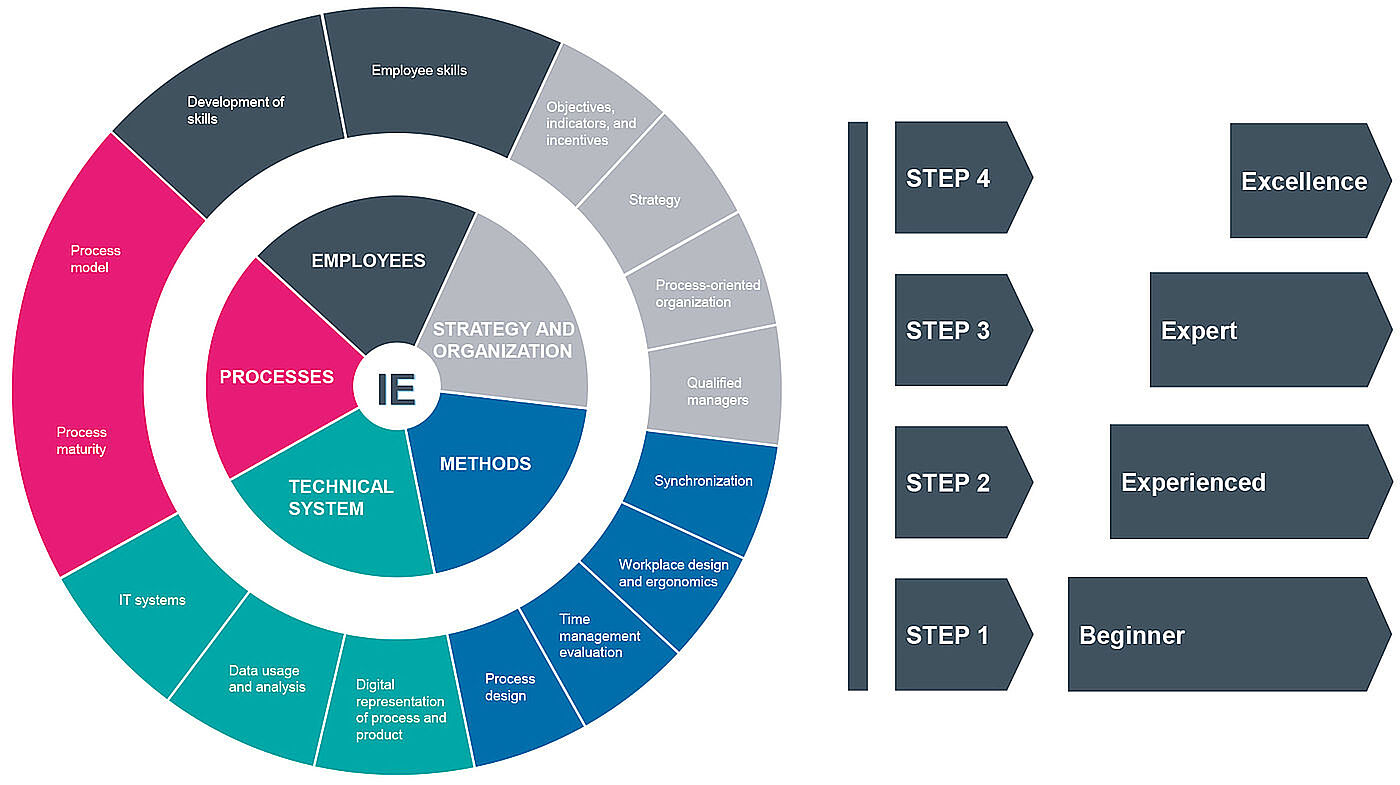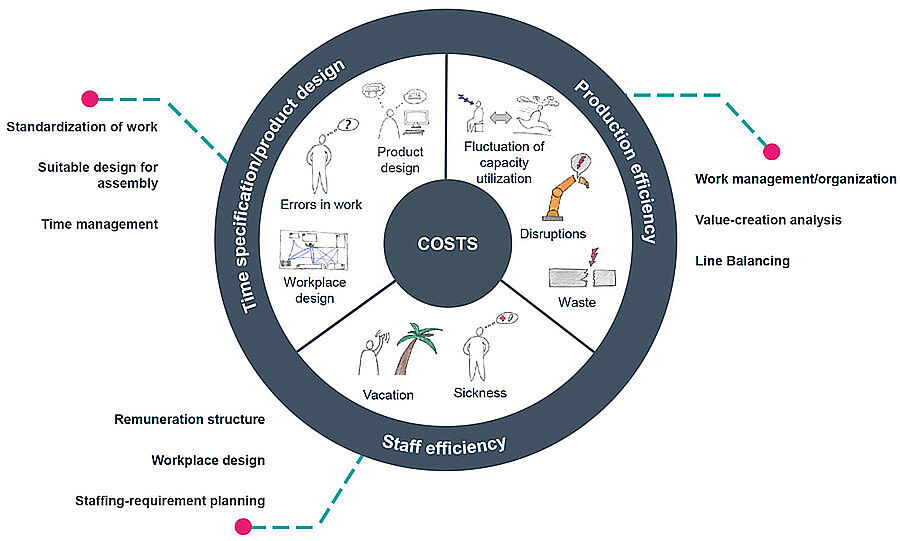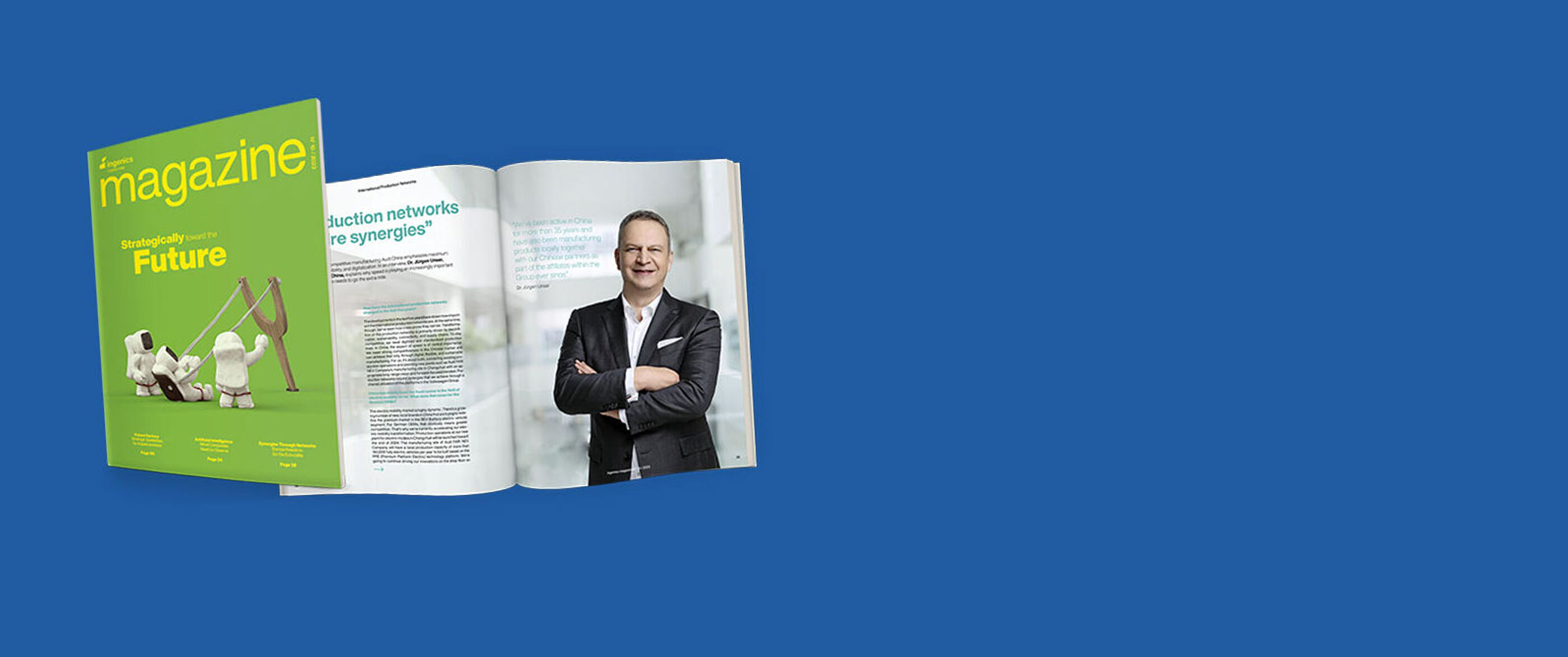Raising Productivity Sustainably with Industrial Engineering
 ©
©
How does industrial engineering help to increase the productivity of an organization?
At many companies, increasingly complex products and projects, ever-higher demands from customers, and a deep need for production to be transformation-ready are meeting internal organizational structures that are slimmed down and have insufficient expertise in or capacity for industrial engineering. The productivity-management shortcomings that result from this pose an existential threat to the competitive position of a company. In addition, employee motivation is often also “impaired” by a number of lean and CIP activities that previously lost effectiveness due to a lack of sustainability. On the other hand, industrial engineering with an optimum focus on the company ensures the necessary structures and systems for sustainable productivity increases.
Ingenics, with its industrial engineering philosophy, is one of few consultancies to pursue a holistic approach – from strategic development through to tactical structures and methods and fully exploiting actual potential in operations. This extends far beyond typical lean and CIP projects. The approach encompasses the establishment of an industrial engineering (IE) system, with corresponding structures and process standards, adapted to the individual company.
The structures, processes, and methods built up in connection with this are used for the operation and optimization of the production system. Employee involvement is a high priority under the approach. As a result, support is given for a more sustainable and holistic implementation of the lean philosophy and a CIP organizational structure is established.

Overcoming Crisis Resiliently
How companies in the mechanical-engineering sector can protect themselves today and become stronger for tomorrow. Every company’s current situation and its resilience strongly depend on its product range, its operational efficiency, and the complexity of its supply chain. This white paper describes the three key challenges that confront businesses in the mechanical-engineering sector, both currently as well as in comparable crises in the future. This document will help you define a structured, pragmatic approach with which you can identify the correct fields of action in your situation and implement sets of actions quickly and successfully.
DownloadBased on its decades of experience providing intensive guidance to SMEs and major companies, Ingenics Consulting believes that there are three main fields of action for the establishment of an industrial engineering system in businesses:
- gauging the maturity of the industrial engineering system
- strategic direction and derivation of the Industrial Engineering 4.0 strategic model
- establishment of the industrial engineering system
1. Gauging the maturity of the industrial engineering system
A detailed determination of the state of things is essential in order for an industrial engineering system to exploit productivity reserves fully. When gauging the company’s position, its industrial engineering potential is investigated.
The analysis focuses on the following:
- strategy and target IE system
- IE business processes
- employee skills
- methodological expertise in designing processes, designing the workplace, designing products, determining timing specifications, and planning and controlling performance
- technical system and infrastructure
A key element to gauging the company’s position is an IE-system maturity model that has been refined over the years. It describes the “ideal” state of the IE organizational structure being practiced, addressing the technical system, process, methods, employees, strategy, and organization.
The maturity is determined in fine detail using one of the four maturity levels provided by the model. The degree of discrepancy with the “ideal” state reveals the individual company’s need for action, which is split up into priorities and progressively exploited, with progress in turn being measured using the model.
During this stage, the company’s management gains a detailed insight as to where it stands with the exploitation of productivity reserves and obtains a concrete plan for establishing or developing the industrial engineering system.
2. Strategic direction and derivation of the Industrial Engineering 4.0 strategic model
The sustainable establishment of an industrial engineering system requires integration with the company’s overall strategy. The strategic direction and organization of the company and the relevant framework for the IE system are determined together with the company for this.
The following questions are answered at this stage, including with the help of the maturity model:
- What objectives and fields of action are rooted in the company’s strategy for industrial engineering?
- Is there a formulated Industry 4.0 vision for the company’s industrial engineering?
- Has there existed tactical and operational planning of objectives and has there existed a process/organizational model for the company’s industrial engineering?
- What effect does the target system have on productivity management?
- What methods and standards are used and what is their process maturity?
- What technical systems support the planning of products, processes, and production with regard to the provision and usage of data?
- Do the IE employees’ job descriptions reflect the industrial engineering strategy and have they supported it?
Answering these questions together produces the underlying concept for the industrial engineering system and, by extension, the company’s own strategic model for Industrial Engineering 4.0.
3. Establishment of the industrial engineering system
After gauging the company’s position and determining strategic, tactical, and operational fields of action, the specific productivity reserves and the potential in the company are exploited. Determining the success of this is the establishment of a sustainable industrial engineering system for a long-term focus on productivity.
The fields of action uncovered by the maturity model and performance checks form the guidelines for this. The client is given consistent, operation-centric guidance for the exploitation of these fields of action.
The following consultancy services and methods are tangible levers used by Ingenics for implementation:
- lean management and leadership
- productivity management with planning and controlling of performance
- Value Stream Analysis 4.0
- planning and optimization of processes
- workplace design and ergonomics
- shop-floor management
- identification and elimination of waste
- determination of timing specifications, for example by analyzing methods like time analyses according to the MTM method, the Maynard operation-sequence technique (MOST), and other data-capture methods
- leveling of work systems using line balancing
- calculation of staffing requirements
- incentive and remuneration systems
- production-pace control (determining pace and optimization)
- the Ingenics Industrial Engineering Cockpit, a dashboard and metrics system for each individual client (core component of the IE system)
Industrial Engineering System Constantly Exploits Company Productivity Reserves
Industrial engineering with an optimum focus on the company ensures the necessary structure and corresponding systems, cementing competitiveness through:
- a sustainable increase in productivity
- optimization of business processes
- enhancement of detailed task sequences in the production process
- a relevant increase in transparency within the workplace organizational structure
- incorporation and optimization of infrastructure and the regulation framework for the workplace organizational structure
- an effective control system for analyzing discrepancies and identifying productivity reserves over the long term
- general optimization of the interaction between people, materials, and machines
- the sustainable and holistic implementation of lean and CIP philosophies
- the maintenance and improvement of employee health, performance, and satisfaction




